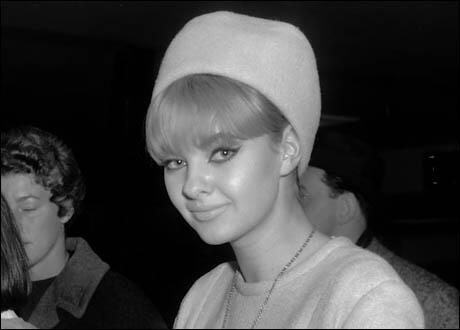On this day on 18th December
On this day 1707 religious leader Charles Wesley, the son of the rector of Epworth, Lincolnshire, was born. He studied at Christ College, Oxford, and became a member of a religious group that included his brother, John Wesley and George Whitefield. The group became became known as the Holy Club or the Oxford Methodists.
In 1735 Charles and John Wesley became missionaries in Georgia, America. They returned to England five years later and for the rest of his life Charles became the able lieutenant to his more charismatic brother. Charles wrote over 5,500 hymns, including the popular Jesu, Lover of My Soul and Hark, the Herald Angels Sing. Charles Wesley died in 1788.
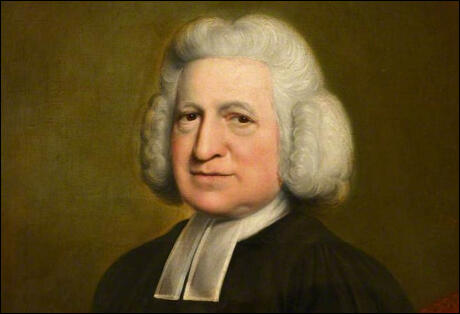
On this day 1835 American theologian, Lyman Abbott, the son of Jacob Abbott, the professor of mathematics at Amherst College, was born in Roxbury, Massachusetts. During his childhood he lived in Farmington, Maine. Abbott graduated from New York University (1853) he worked as a lawyer before studying theology. Ordained in 1860 he served as a pastor and edited the Illustrated Christian Union (1870-76), The Christian Union (1876-93), where he replaced Henry Ward Beecher, as the editor of The Outlook (1893-1922).
After the death of Beecher in 1890 he replaced him as the pastor of the Plymouth Congregational Church in Brooklyn. Abbott took a keen interest in social problems and wrote several books including The Evolution of Christianity (1896), Christianity and Social Problems (1897), The Rights of Man (1901), The Christian Ministry (1905), The Personality of God (1905), Industrial Problems (1905), Christ's Secret of Happiness (1907), The Home Builder (1908), The Temple (1909), The Spirit of Democracy (1910), America in the Making (1911), Letters to Unknown Friends (1913), Reminiscences (1915), The Twentieth Century Crusade (1918) and What Christianity Means to Me (1921).
Lyman Abbott died in New York City on 22nd October, 1922, and was buried in the New Windsor Cemetery in Cornwall-on-Hudson.
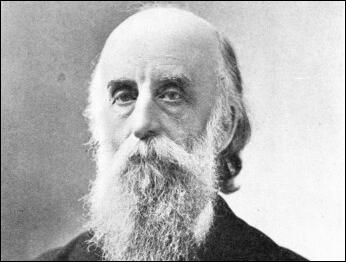
On this day in 1852 George Henry White, was born a slave in Rosindale, North Carolina. After working as a farm labourer he studied at Howard University (1873-1877). This was followed by a period as a school teacher and as a lawyer in New Bern.
A member of the Republican Party, White was elected to the House of Representatives in 1880. He campaigned for increased spending on African American education. White helped to establish four new schools and for a while served as principal of the school in New Bern.
In 1885 White was elected to the state Senate where he served on the committees for the insane asylum, insurance and judiciary. He also continued to work as a lawyer in New Bern and Taboro.
White was elected to Congress in 1896. He was the last former slave to serve in Congress and by 1898 was the only African American in the House of Representatives. White campaigned against racial discrimination and urged the enforcement of the second section of the Fourteenth Amendment that reduced the representation in the House of Representatives of those states which denied African Americans the vote.
In one speech in 1900 he argued: "It is easy for these gentlemen (white politicians) to taunt us with our inferiority, at the same time not mentioning the cause of this inferiority. It is rather hard to be accused of shiftlessness and idleness when the accuser closes the avenue of labour and industrial pursuits to us. It is hardly fair to accuse us of ignorance when it was made a crime under the former order of things to learn enough about letters to even read the Word of God."
In January, 1901, White proposed a bill that would make lynching of American citizens a federal crime. He argued that any person participating actively in or acting as an accessory in a lynching should be convicted of treason. White pointed out that lynching was being used by white mobs in the Deep South to terrorize African Americans. He illustrated this by showing that of the 109 people lynched in 1899, 87 were African Americans. Despite White's passionate plea, the bill was easily defeated.
White was aware that his outspoken comments on civil rights would result in him losing his next election. In his last speech in Congress on 29th January, 1901, White predicted: "This is perhaps the Negroes' temporary farewell to the American Congress; but let me say, Phoenix-like he will rise up some day and come again. These parting words are in behalf of an outraged, heart-broken bruised and bleeding, but God-fearing people, faithful, industrious, loyal, rising people - full of potential force." White's forecast was correct and it was not until 1928 that another African American, Oscar DePriest, was elected to Congress.
In 1905 White moved to Philadelphia where he successfully practiced law and established the People's Saving Bank in Lombard Street. This bank was able to help African Americans to purchase homes and start businesses. As well as helping to establish Whitesboro, a community for migrating African Americans from the Deep South, White was active in the National Association for the Advancement of Coloured People (NAACP). George Henry White died in 1918.
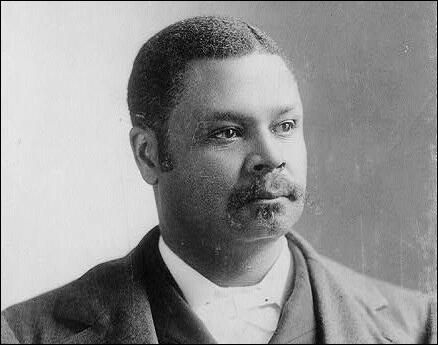
On this day in 1878 Joseph Stalin was born in Gori, Georgia. His mother, Ekaterina Djugashvilli, was married at the age of 14 and Joseph was her fourth child to be born in less than four years. The first three died and as Joseph was prone to bad health, his mother feared on several occasions that he would also die. Understandably, given this background, Joseph's mother was very protective towards him as a child.
Joseph's father, Vissarion Djugashvilli, was a bootmaker and his mother took in washing. He was an extremely violent man who savagely beat both his son and wife. As a child, Joseph experienced the poverty that most peasants had to endure in Russia at the end of the 19th century.
Soso, as he was called throughout his childhood, contacted smallpox at the age of seven. It was usually a fatal disease and for a time it looked as if he would die. Against the odds he recovered but his face remained scarred for the rest of his life and other children cruelly called him "pocky".
Joseph's mother was deeply religious and in 1888 she managed to obtain him a place at the local church school. Despite his health problems, he made good progress at school. However, his first language was Georgian and although he eventually learnt Russian, whenever possible, he would speak and write in his native language and never lost his distinct Georgian accent. His father died in 1890. Bertram D. Wolfe has argued "his mother, devoutly religious and with no one to devote herself to but her sole surviving child, determined to prepare him for the priesthood."
Stalin left school in 1894 and his academic brilliance won him a free scholarship to the Tiflis Theological Seminary. He hated the routine of the seminary. "In the early morning when they longed to lie in, they had to rise for prayers. Then, a hurried light breakfast followed by long hours in the classroom, more prayers, a meager dinner, a brief walk around the city, and it was time for the seminary to close. By ten in the evening, when the city was just coming to life, the seminarists had said their prayers they were on their way to bed." One of his fellow students wrote: "We felt like prisoners, forced to spend our young lives in this place although innocent."
Stalin told Emil Ludwig that he hated his time in the Tiflis Theological Seminary. "The basis of all their methods is spying, prying, peering into people's souls, to subject them to petty torment. What is the good in that? In protest against the humiliating regime and the jesuitical methods that prevailed in the seminary, I was ready to become, and eventually did become, a revolutionary, a believer in Marxism."
While studying at the seminary he joined a secret organization called Messame Dassy (the Third Group). Members were supporters of Georgian independence from Russia. Some were also socialist revolutionaries and it was through the people he met in this organization that Stalin first came into contact with the ideas of Karl Marx. Stalin later wrote: "I became a Marxist because of my social group (my father was a worker in a shoe factory and my mother was also a working woman), but also because of the harsh intolerance and Jesuitical discipline that crushed me so mercilessly at the Seminary... The atmosphere in which I lived was saturated with hatred against Tsarist oppression."
In May, 1899, Joseph Stalin left the Tiflis Theological Seminary. Several reasons were given for this action including disrespect for those in authority and reading forbidden books. According to the seminary conduct book he was expelled "as politically unreliable".Stalin was later to claim that the real reason was that he had been trying to convert his fellow students to Marxism.
Stalin's mother provided a different version of events: "I wanted only one thing, that he should become a priest. He was not expelled. I brought him home on account of his health. When he entered the seminary he was fifteen and as strong as a lad could be. But overwork up to the age of nineteen pulled him down, and the doctors told me that he might develop tuberculosis. So I took him away from school. He did not want to leave. But I took him away. He was my only son."
Soon after leaving the seminary he began reading Iskra (the Spark), the newspaper of the Social Democratic Labour Party (SDLP). It was the first underground Marxist paper to be distributed in Russia. It was printed in several European cities and then smuggled into Russia by a network of SDLP agents. The editorial board included Alexander Potresov, George Plekhanov, Pavel Axelrod, Vera Zasulich, Lenin, Leon Trotsky and Julius Martov.
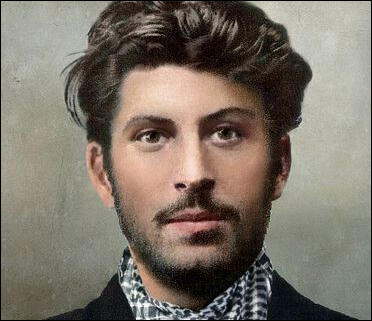
On this day in 1889 Elsie Bowerman was born in Tunbridge Wells on 18th December 1889. She was educated at Wycombe Abbey School (1901–7) before going to finishing school in Paris.
According to Helena Wojtczak: "Around 1907, the widowed Edith Bowerman, now 43, married 67-year-old Alfred Benjamin Chibnall, a wealthy farmer. This alliance remains mysterious. Hastings Rates books and street directories show no trace that the couple ever lived together."
In 1908 Elsie Bowerman went to Girton College. The following year Bowerman and her mother joined the Women's Social and Political Union (WSPU). She established a branch in Girton and in October 1910 she invited Margery Corbett-Ashby to speak to the students. Later she arranged for Constance Lytton to speak at the college. She also sold copies of Votes for Women and gave away free copies to those who could not afford the.
On 22nd November, Elsie's mother, Edith Chibnall joined a WSPU deputation to the House of Commons. She was assaulted by a policeman. She explained in a letter to Elsie: "He caught me by the hair and flinging me aside he said, Die, then! I found afterwards that so much force had been used that my hairpins were bent double in my hair and my sealskin coat was torn to ribbons." Elsie replied: "So sorry you have had such a bad time. It is sickening that this endless fighting has to go on. I am frightfully sorry Mrs. Pankhurst & Mrs. Haverfield were arrested... It is a great pity to lose all our best people just before the Election. I hope you won't go on any more raids. I think you have done your share for this week."
In 1911 Bowerman graduated with a second-class degree in medieval and modern languages. She now moved to St Leonards where her mother had established a branch of the WSPU. Bowerman helped her mother run the WSPU shop on the Grand Parade at Hastings. Bowerman was also a paid full-time organizer for the organization.
Elsie Bowerman and her mother decided to take a holiday in the Ohio. On 15th April 1912 they were passengers on the Titanic when it sank. As they were both first-class passengers every effort was made to save them. Elsie later wrote: "The silence when the engines stopped was followed by a steward knocking on our door and telling us to go on deck. This we did and were lowered into life-boats, where we were told to get away from the liner as soon as we could in case of suction. This we did, and to pull an oar in the midst of the Atlantic in April with ice-bergs floating about, is a strange experience."
On the outbreak of the First World War, Bowerman supported the decision by Emmeline Pankhurst, to help Britain's war effort. In 1914 Eveline Haverfield founded the Women's Emergency Corps, an organisation which helped organize women to become doctors, nurses and motorcycle messengers. Christabel Marshall described Haverfield as looking "every inch a soldier in her khaki uniform, in spite of the short skirt which she had to wear over her well-cut riding-breeches in public." Appointed as Commandant in Chief of the Women's Reserve Ambulance Corps, Haverfield was instructed to organize the sending of the Scottish Women's Hospital Units to Serbia.
On 5th July, 1916, Elsie Bowerman wrote to her mother: "Mrs Haverfield has just asked me to go out to Serbia at the beginning of August, to drive a car - May I go? I know Miss Whitelaw would let me off Wycombe to go. It is what I've been dying to do & drive a car ever since the war started. I should have to spend the week after the procession learning to drive - the cars are Fords - if I went I would come home when I come back I would not have to go to W.A. It is really like a chance to go to the front. They want drivers so badly. So do say yes - It is too thrilling for words."
According to Elizabeth Crawford: "In September 1916 Elsie Bowerman sailed to Russia as an orderly with the Scottish women's hospital unit, at the request of the Hon. Evelina Haverfield, a fellow suffragette whom she had known for several years. With this unit she travelled via Archangel, Moscow, and Odessa to serve the Serbian and Russian armies in Romania. The women arrived as the allies were defeated, and were soon forced to join the retreat northwards to the Russian frontier."
While awaiting her passage home, in March 1917, Elsie Bowerman witnessed the overthrow of Tsar Nicholas II in St Petersburg. She wrote to her mother: "Throughout we have met with the utmost politeness & consideration from everyone. Revolutions carried out in such a peaceful manner really deserve to succeed. Today weapons only seem to be in the hands of responsible people - not as yesterday, carried in many cases by excited youths. Heard that the ministers have now surrendered. Some have been shot, or shot themselves."
In 1917 Elsie Bowerman became a member of the The Women's Party, an organisation established by Emmeline Pankhurst and Christabel Pankhurst. Its twelve-point programme included: (1) A fight to the finish with Germany. (2) More vigorous war measures to include drastic food rationing, more communal kitchens to reduce waste, and the closing down of nonessential industries to release labour for work on the land and in the factories. (3) A clean sweep of all officials of enemy blood or connections from Government departments. Stringent peace terms to include the dismemberment of the Hapsburg Empire." The party also supported: "equal pay for equal work, equal marriage and divorce laws, the same rights over children for both parents, equality of rights and opportunities in public service, and a system of maternity benefits." Christabel and Emmeline had now completely abandoned their earlier socialist beliefs and advocated policies such as the abolition of the trade unions.
After the passing of the Qualification of Women Act in 1918, Christabel became one of the seventeen women candidates that stood in the post-war election. Christabel Pankhurst represented the The Women's Party in Smethwick. Elsie Bowerman became her agent but despite the fact that the Conservative Party candidate agreed to stand down, she lost a straight fight with the representative of the Labour Party by 775 votes.
In 1922 Elsie Bowerman and Flora Drummond established the Women's Guild of Empire, a right wing league opposed to communism. Drummond's biographer, Krista Cowman, pointed out: "When the war ended she was one of the few former suffragettes who attempted to continue the popular, jingoistic campaigning which the WSPU had followed from 1914 to 1918. With Elsie Bowerman, another former suffragette, she founded the Women's Guild of Empire, an organization aimed at furthering a sense of patriotism in working-class women and defeating such socialist manifestations as strikes and lock-outs." By 1925 it was claimed the organization had a membership of 40,000. In April 1926, Bowerman and Drummond led a demonstration that demanded an end to the industrial unrest that was about to culminate in the General Strike.
Elsie Bowerman, a member of the Middle Temple, read for the bar, and became one of the first women barristers. According to Elizabeth Crawford: "She practised on the south-eastern circuit from 1928 until 1946, was involved with the Sussex sessions from 1928 until 1934, and wrote The Law of Child Protection (1933)."
In 1938, she joined forces with the Marchioness of Reading, to establish the Women's Voluntary Service, and from 1938 to 1940 edited its Monthly Bulletin. During the Second World War she worked for the Ministry of Information (1940–41) and was liaison officer with the North American Service of the BBC (1941–5). Elsie Bowerman suffered a stroke, and died at the Princess Alice Hospital, Eastbourne, on 18th October 1973.
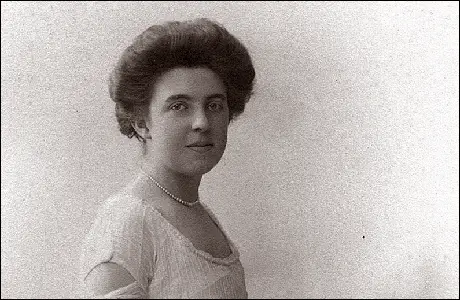
On this day in 1913 Willy Brandt is born in Lubeck. He joined the Social Democratic Party in 1930 and was active in the campaign against Adolf Hitler and the Nazi Party.
Brandt, like many young radicals, was critical of the leadership of people like Rudolf Breitscheild. In 1931 he helped form Socialist Workers Party (SAP), a Marxist left-wing organization. By October 1931 SAP claimed to have over 50,000 members.
When Adolf Hitler came to power members of the Socialist Workers Party were arrested by the Nazi authorities. Brandt fled to Norway and after studying at Oslo University he worked as a journalist.
In February 1937, Brandt travelled to Spain to cover the Spanish Civil War. He based himself in Barcelona where he developed close links with the Worker's Party (POUM). While covering the war he developed a life long suspicion of communism. He later recalled how the "POUM were persecuted, dragged before the courts, or even murdered by the Communists."
On his return to Norway he wrote about the dangers for socialists working with Joseph Stalin and the Soviet Union. After the signing of the Nazi-Soviet Pact he wrote: "It is hardly a novel situation to find the leaders of the Soviet Union in a state of outright war against the socialist movement. It has happened before. But today the whole movement is obliged to stand up and fight, and draw a clear dividing line between itself and the Soviet Union. It is not the socialist movement but the Soviet Union which has changed. It is not the socialist movement but the Soviet Union which has entered a pact of friendship with Nazism.
With the invasion of the German Army in 1940 Brandt was forced to move to Sweden. For the rest of the Second World War Brandt gave support to the German resistance movement.
Brandt returned to Germany after the war and in 1949 was elected to the Bundestag. In 1957 Brandt became a mayor of West Berlin and campaigned in favour of the removal of the Berlin Wall.
A socialist, Brandt became chairman of the Sozialdemokratische Partei Deutschlands (SPD) in 1964. Two years later he joined the coalition government led by Kurt Kiesinger. Brandt, as Foreign Minister, developed the policy of Ostpolitik (reconciliation between eastern and western Europe).
Brandt was a strong supporter of Britain joining the European Economic Community. In December 1967 he argued "Our own interest, which it is up to us to represent, and our understanding of the state of European interests, obliges us to speak a clear language and urge our French neighbours not to make things too difficult for themselves and others."
In 1969 Brandt became Chancellor of Federal Republic of Germany (West Germany). He continued with his policy of Ostpolitik and in 1970 negotiated an agreement with the Soviet Union accepting the frontiers of Berlin. Later that year he signed a non-aggression pact with Poland.
The Basic Treaty was signed in 1972. In this treaty the Federal Republic of Germany and German Democratic Republic committed themselves to developing normal relations on the "basis of equality, guaranteeing their mutual territorial integrity as well as the border between them, and recognizing each other's independence and sovereignty".
As a result of Ostpolitik the Federal Republic of Germany exchanged ambassadors with the Soviet Union, Poland, Czechoslovakia, Hungary and Bulgaria. Brandt won the Nobel Peace Prize in 1971.
Brandt was forced to resign as Chancellor in April 1974 after it was discovered that his close political aide, Gunther Guillaume, was an East German spy.
Brandt continued to be active in politics and between 1977 and 1983 was chairman of the Brandt Commission on economic development. Its report, North-South: A Programme for Survival, argued that the rich north should help countries in the poor southern hemisphere. Willy Brandt died on 8th October 1992.
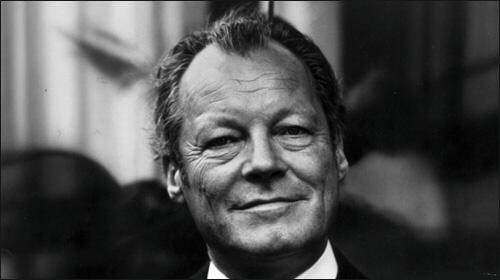
On this day in 1915 Nina Allender publishes an anti-war cartoon in The Suffragist. Nina Evans, the daughter of a superintendent of schools, was born in Auburn, Kansas, on 25th December, 1872. She attended Concoran School of Art and Pennsylvania Academy of the Fine Arts.
In 1893, at the age of 19 Nina Evans, Nina married an English banker, Charles Allender. He deserted her and it later emerged that he had left England to avoid a prison sentence for embezzlement and forgery. Nina sued Charles for divorce in January 1905, alleging infidelity. Their divorce was granted that year.
At the age of 38, Nina Allender became actively involved in the National American Woman Suffrage Association (NAWSA). The leaders of this organisation include Elizabeth Cady Stanton, Susan B. Anthony, Carrie Chapman Catt, Frances Willard, Matilda Joslyn Gage and Anna Howard Shaw.
In 1912, Allender had volunteered to assist NAWSA's Congressional Committee in planning their March 3, 1912 suffrage pageant in Washington. Allender was appointed chair of the committee on "outdoor meetings" as well as on "posters, post cards and colors." Soon afterwards she became president of the District of Columbia Woman Suffrage Association and was a featured speaker at numerous local gatherings. At this time she was considered to be one of the movement's finest orators. In 1913, Allender joined with Jeannette Rankin and thirteen other women representing different states to meet with President Woodrow Wilson in a suffrage deputation.
In 1913 Allender joined the Congressional Union for Women Suffrage (CUWS). Later that year the CUWS started its own magazine, The Suffragist. Its first editor was the veteran muckraking journalist, Rheta Childe Dorr. The magazine published articles by leading members such as Alice Paul, Lucy Burns and Inez Milholland. Allender became Its main cartoonist. The journal also published cartoons by Cornelia Barns, Rollin Kirby and Boardman Robinson.
It was said: "She (Nina Allender) gave to the American public in cartoons that have been widely copied and commented on, a new type of suffragist - the young and zealous women of a new generation determined to wait no longer for a just right. It was Mrs. Allender's cartoons more than any other one thing that in the newspapers of this country began to change the cartoonist's idea of the suffragist."
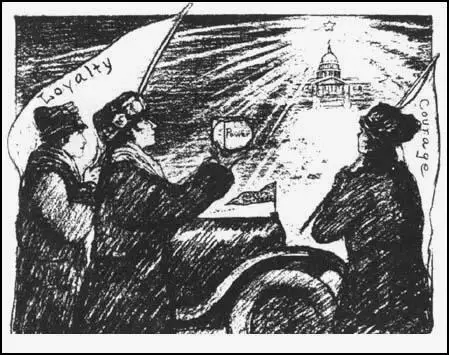
On this day in 1932 German theorist Eduard Bernstein died. Bernstein was born in Berlin, Germany on 6th January, 1850. The son of Jewish parents, his father was a railroad engineer.
Bernstein worked as a bank clerk and in 1872 he joined the Social Democrat Party (SDP). In the 1877 General Election in Germany the SDP won 12 seats. This worried Otto von Bismarck, and in 1878 he introduced an anti-socialist law which banned party meetings and publications.
After the passing of the anti-socialist law Bernstein emigrated to Switzerland where he became editor of the underground socialist journal, Der Sozialdemokrat. After being expelled from Switzerland he moved to England where he worked closely with Frederick Engels and members of the Fabian Society.
While living in London Bernstein gradually became convinced that the best way to obtain socialism in an industrialized country was through trade union activity and parliamentary politics. He published a series of articles where he argued that the predictions made by Karl Marx about the development of capitalism had not come true. He pointed out that the real wages of workers had risen and the polarization of classes between an oppressed proletariat and capitalist, had not materialized. Nor had capital become concentrated in fewer hands.
Bernstein's revisionist views appeared in his extremely influential book Evolutionary Socialism (1899). His analysis of modern capitalism undermined the claims that Marxism was a science and upset leading revolutionaries such as Vladimir Lenin and Leon Trotsky.
In 1901 Bernstein returned to Germany. This brought him into conflict with left-wing of the Social Democrat Party that rejected his revisionist views on how socialism could be achieved. This included those like August Bebel, Karl Kautsky, Clara Zetkin, Karl Liebknecht and Rosa Luxemburg, who still believed that a Marxist revolution was still possible.
Bernstein was elected to the Reichstag (1902-06 and 1912-18) where he led the right-wing of the Social Democrat Party. However, he sided with the left-wing over Germany's participation in the First World War and in 1915 voted against war credits.
In April 1917 left-wing members of the Social Democratic Party (SDP) formed the Independent Socialist Party. Members included Bernstein, Kurt Eisner, Karl Kautsky, Julius Leber, Rudolf Breitscheild and Rudolf Hilferding.
After the war he joining the leadership of the Social Democrat Party in condemning the German Revolution. In the government formed by Friedrich Ebert, Bernstein served as secretary of state for economy and finance.
Elected to the Reichstag in 1920 Bernstein bravely opposed the rise of the extreme right and made several powerful speeches against Adolf Hitler and the Nazi Party.
Sidney Hook met Bernstein in 1928 and in his autobiography Out of Step: An Unquiet Life in the 20th Century (1987) recalled him talking about Eleanor Marx and Edward Aveling: "I made several efforts to arrange a meeting with Eduard Bernstein, the famous revisionist of Marx, then living in retirement. His figure and outlook, in the perspective of the fifty years after Marx's death, had grown enormously. I was put off several times, and when I finally met him, I realized why. He was suffering from advanced arteriosclerosis and was attended by a nurse. He seemed at first reluctant to talk about his reminiscences of Marx, but at the outset of our talk, to my chagrin, was eager to describe his first day at school, about which he had very vivid memories. I kept reverting to various episodes of Marx's life and to some of Marx's literary remains, which Engels had entrusted to Bernstein. His manner was benign and friendly."
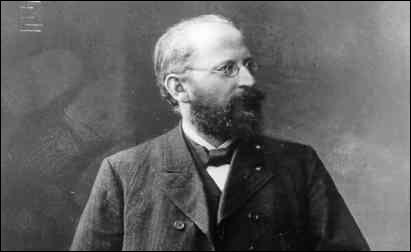
On this day in 1941 the National Service Act was passed by Parliament. The British government introduced conscription in 1938. All men aged between 18 and 41 had to register with the government. Government officials then decided whether they should go into the army or do other war work. Most young men were recruited into the armed forces. This created a severe labour shortage and on 18th December 1941, the National Service Act was passed by Parliament. This legislation called up unmarried women aged between twenty and thirty. Later this was extended to married women, although pregnant women and mothers with young children were exempt from this work.
One vital need was for women to work in munitions factories. Muriel Simkin worked in a munitions factory in Dagenham. "We had to wait until the second alarm before we were allowed to go to the shelter. The first bell was a warning they were coming. The second was when they were overhead. They did not want any time wasted. The planes might have gone straight past and the factory would have stopped for nothing. Sometimes the Germans would drop their bombs before the second bell went. On one occasion a bomb hit the factory before we were given permission to go to the shelter. The paint department went up. I saw several people flying through the air and I just ran home. I was suffering from shock. I was suspended for six weeks without pay. They would have been saved if they had been allowed to go after the first alarm. It was a terrible job but we had no option. We all had to do war work. We were risking our lives in the same way as the soldiers were."
Other women were conscripted to work in tank and aircraft factories, civil defence, nursing, transport and other key occupations. This involved jobs such as driving trains and operating anti-aircraft guns, that had been traditionally seen as 'men's work'. This legislation called up unmarried women aged between twenty and thirty. Later this was extended to married women, although pregnant women and mothers with young children were exempt from this work.
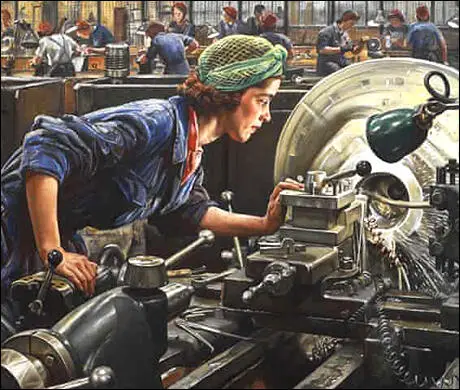
On this day in 1943 footballer Harry Goslin dies of his wounds. Goslin signed for Bolton Wanderers, for a fee of £25 in 1930. Goslin, a right half, made his debut in a 7-2 defeat at Liverpool but he kept his place in the first-team. In the 1932-33 season Bolton were relegated to the Second Division of the Football League.
After finishing 3rd in 1933-34 Bolton Wanderers achieved promotion in 1934-35 when the club finished 2nd to Brentford. That season Goslin did not miss a game and in 1936 Goslin became captain of the club. Under his leadership Bolton maintained its position in the First Division of the Football League.
As the authors of Wartime Wanderers point out: "Goslin was a tall, athletic, ramrod-straight man with piercing blue eyes, whose physical presence combined with his pleasant but firm personality made him the ideal choice for club captain. Under his astute leadership the club's fortunes improved." Married with two children, Goslin began preparing for his future and opened a sports shop in Bolton.
On 15th March, 1939, Adolf Hitler ordered the German Army to invade Czechoslovakia. It seemed that war was inevitable. On 8th April, Bolton Wanderers played a home game against Sunderland. Before the game started, Harry Goslin, the team captain, spoke to the crowd: "We are facing a national emergency. But this danger can be met, if everybody keeps a cool head, and knows what to do. This is something you can't leave to the other fellow, everybody has a share to do." Goslin told the supporters he had joined the British Army.
Of the 35 players on the staff of Bolton Wanderers, 32 joined the armed services and the other three went into the coal mines and munitions. This included Harry Hubbick, who resumed his career down the pits and Jack Atkinson and George Hunt served in the local police force. A total of 17 players, including Harry Goslin, Danny Winter, Billy Ithell, Albert Geldard, Tommy Sinclair, Don Howe, Ray Westwood, Ernie Forrest, Jackie Roberts, Jack Hurst and Stan Hanson, joined the 53rd (Bolton) Field Regiment.
On 15th July 1942, the 53rd (Bolton) Field Regiment was told to mobilise for overseas service. The following month they arrived in Egypt and immediately became involved in defending Alam el Halfa. On 30th August, 1942, General Erwin Rommel attacked Alam el Halfa but was repulsed by the Eighth Army. General Bernard Montgomery responded to this attack by ordering his troops to reinforce the defensive line from the coast to the impassable Qattara Depression. Montgomery was now able to make sure that Rommel and the German Army was unable to make any further advances into Egypt.
On 22nd October 1942, the 53rd (Bolton) Field Regiment took up battle positions. The following day General Bernard Montgomery launched Operation Lightfoot with the largest artillery bombardment since the First World War. The attack came at the worst time for the Deutsches Afrika Korps as Erwin Rommel was on sick leave in Austria. His replacement, General George Stumme, died of a heart-attack the day after the 900 gun bombardment of the German lines. Stume was replaced by General Ritter von Thoma and Adolf Hitler phoned Rommel to order him to return to Egypt immediately.
The Germans defended their positions well and after two days the Eighth Army had made little progress and Bernard Montgomery ordered an end to the attack. When Erwin Rommel returned he launched a counterattack at Kidney Depression (27th October). Montgomery now returned to the offensive and the 9th Australian Division created a salient in the enemy positions.
Winston Churchill was disappointed by the Eighth Army's lack of success and accused Montgomery of fighting a "half-hearted" battle. Montgomery ignored these criticisms and instead made plans for a new offensive, Operation Supercharge.
On 1st November 1942, Montgomery launched an attack on the Deutsches Afrika Korps at Kidney Ridge. After initially resisting the attack, Rommel decided he no longer had the resources to hold his line and on the 3rd November he ordered his troops to withdraw. However, Adolf Hitler overruled his commander and the Germans were forced to stand and fight.
The next day Montgomery ordered his men forward. Lieutenant Harry Goslin and the 53rd (Bolton) Field Regiment joined the pursuit. The Eighth Army broke through the German lines and Erwin Rommel, in danger of being surrounded, was forced to retreat. Those soldiers on foot, including large numbers of Italian soldiers, were unable to move fast enough and were taken prisoner.
The British Army recaptured Tobruk on 12th November, 1942. During the El Alamein campaign half of Rommel's 100,000 man army was killed, wounded or taken prisoner. He also lost over 450 tanks and 1,000 guns. The British and Commonwealth forces suffered 13,500 casualties and 500 of their tanks were damaged. However, of these, 350 were repaired and were able to take part in future battles.
After spending time in Baghdad, the 53rd (Bolton) Field Regimentmoved to Kirkurk on 8th January 1943. They were eventually relocated to Kifri which was to become their main base for the next five months. While there Harry Goslin, Stan Hanson, Don Howe and Ernie Forrest played for the British Army against the Polish Army in Baghdad. Howe scored one of the goals in the 4-2 victory.
The 53rd (Bolton) Field Regiment joined General Bernard Montgomery and the 8th Army in the invasion of Italy. On 24th September, 1943, Goslin and his men landed at Taranto. Three days later the men had reached Foggia without too much opposition. However, when the men were ordered to cross the River Sangro the regiment took part in some of the most difficult fighting of the Second World War.
At the end of November Don Howe was wounded and evacuated to a dressing station. After another enemy air attack Ray Westwood and Stan Hanson came close to being killed. The shelling continued and on 14th December, 1943, Harry Goslin was hit in the back by shrapnel. He died from his wounds a few days later. The Bolton Evening News reported: "Harry Goslin was one of the finest types professional football breeds. Not only in the personal sense, but for the club's sake, and the game's sake. I regret his life has had to be sacrificed in the cause of war."
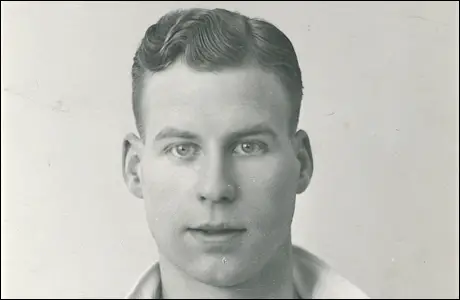
On this day in 1977 Louis Untermeyer, died. Untermeyer was born in New York City on 1st October, 1885. After a brief formal education he left high school without graduating and found work with his father's jewelry manufacturing company.
Untermeyer was very interested in literature and in 1911 he published his first book of poetry, First Love. He also held left-wing political views and was the literary editor of the Marxist journal, The Masses. The assistant editor of the journal, Floyd Dell, later recalled: "The Masses' literary editor, Louis Untermeyer, who had written about poetry for the Friday Review, was a friend already; we were interested in the same things, and lunched together frequently to discuss the universe."
Like most people involved with the journal, Untermeyer believed that the First World War had been caused by the imperialist competitive system. Untermeyer and journalists such as John Reed who reported the conflict for The Masses, argued that the USA should remain neutral. After the USA entered the First World War the team working on The Masses came under government pressure to change its policy. When it refused to do this, the journal lost its mailing privileges.
In July, 1917, it was claimed by the authorities that articles in the journal by Floyd Dell and Max Eastman and cartoons by Art Young, Boardman Robinson and H. J. Glintenkamp had violated the Espionage Act. Under this act it was an offence to publish material that undermined the war effort. The legal action that followed forced The Masses to cease publication. Under this act it was an offence to publish material that undermined the war effort. One of the journals main writers, Randolph Bourne, commented: "I feel very much secluded from the world, very much out of touch with my times. The magazines I write for die violent deaths, and all my thoughts are unprintable." Untermeyer and his friends went on the publish a very similar journal, The Liberator.
By 1923 Untermeyer was vice-president in his father's company but he decided to resign and concentrate on writing. Over the next fifty years he wrote, edited or translated over one hundred books. This included several volumes of his own poetry. He also produced a series of anthologies, notably Modern American Poetry (1919), Modern British Poetry (1920), This Singing World (1923) and Selected Poems and Parodies (1935).
Untermeyer also lectured on poetry, drama and music. In 1939 he was appointed Poet in Residence at the University of Michigan. He also held the same post at the University of Kansas and Iowa State College. In 1939 he published his autobiography From Another World.
Arthur Miller knew him during this period: "Louis Untermeyer, then in his sixties, was a poet and anthologist, a distinguished-looking old New York type with a large aristocratic nose and a passion for conversation, especially about writers and to become a poet... All this with wisecracking and banter, at which Louis was a lovable master, what with his instant recall of every joke and pun he had ever heard."Untermeyer was an entertaining talker and in 1950 became a panelist on the television programme, What's My Line. He continued to be active in campaigning for left-wing causes and as a result the FBI had been collecting a file of his activities. His name was also mentioned during the House of Un-American Activities Committee investigation into communist subversion. This was brought to the attention of the television industry and in 1951 Untermeyer was sacked from the television show and was blacklisted. Like many left-wing artists during this period, Untermeyer became a victim of McCarthyism.
In his autobiography, Timebends - A Life (1987), Arthur Miller, explained how Untermeyer responded to this victimization: "Louis went back to his apartment. Normally we ran into each other in the street once or twice a week or kept in touch every month or so, but I no longer saw him in the neighborhood or heard from him. Louis didn't leave his apartment for almost a year and a half. An overwhelming and paralyzing fear had risen him. More than a political fear, it was really that he had witnessed the tenuousness of human connection and it had left him in terror. He had always loved a lot and been loved, especially on the TV program where his quips were vastly appreciated, and suddenly, he had been thrown into the street, abolished."
In 1956 Untermeyer was awarded a Gold Medal by the Poetry Society of America. He also served as a consultant in English poetry for the Library of Congress from 1961 until 1963.
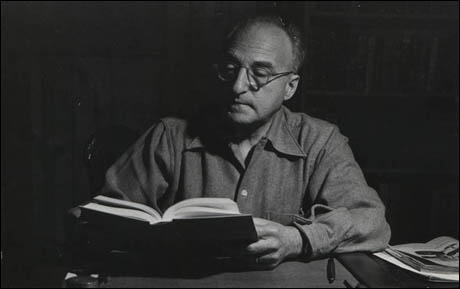
On this day in 1990 Anne Revere, died. Anne Revere was born in New York on 25th June, 1903. The family moved to Westfield, New Jersey when she was a child. In 1926, she graduated from Wellesley College and then studied acting with Maria Ouspenskaya and Richard Boleslavsky.
In 1931 Revere made her Broadway in The Great Barrington. Three years later she appeared as Martha Dobie in the original 1934 production of The Children's Hour. The play written by Lillian Hellman, is set in an all-girls boarding school run by two women, Dobie and Karen Wright (Katherine Emery). An angry student, Mary Tilford, runs away from the school and to avoid being sent back she tells her grandmother that the two headmistresses are having a lesbian affair."
Revere now moved to Hollywood where she appeared in Double Door (1934). Over the next few years she mainly acted in plays but also appeared in several movies including, One Crowded Night (1940), The Tree of Liberty (1940), The Devil Commands (1941), Men of Boys Town (1941), The Flame of New Orleans (1941), Meet the Stewarts (1942), Shantytown (1943), The Song of Bernadette (1943), Rainbow Island (1944), National Velvet (1944) and Forever Amber (1947).
In 1947 Revere became involved in a film project, Gentleman's Agreement, that attempted to deal with the dangerous topic of anti-Semitism. Directed by Elia Kazan, it included a cast of people that shared Revere's left-wing opinions including John Garfield, Gregory Peck, Sam Jaffe, Joan Havoc and Jane Wyatt. The authors of Radical Hollywood (2002) have argued: "Garfield, as the returning Jewish soldier tired of hearing liberal talk about the 'poor little Jews', who hits the hardest, virtually demanding social change; and Anne Revere, the protagonist's mother, who vows to live on to see a better world." The film was a great success and won three Academy Awards.
During this period the House of Un-American Activities Committee (HUAC) opened its hearings concerning communist infiltration of the motion picture industry. The chief investigator for the committee was Robert E. Stripling. The first people it interviewed included Ronald Reagan, Gary Cooper, Ayn Rand, Jack L. Warner, Robert Taylor, Adolphe Menjou, Robert Montgomery, Walt Disney, Thomas Leo McCarey and George L. Murphy. These people named several possible members of the American Communist Party.
As a result their investigations, the HUAC announced it wished to interview nineteen members of the film industry that they believed might be members of the American Communist Party. This included Larry Parks, Herbert Biberman, Alvah Bessie, Lester Cole, Albert Maltz, Adrian Scott, Dalton Trumbo, Edward Dmytryk, Ring Lardner Jr., Samuel Ornitz, John Howard Lawson, Waldo Salt, Bertolt Brecht, Richard Collins, Gordon Kahn, Robert Rossen, Lewis Milestone and Irving Pichel.
The first ten witnesses called to appear before the HUAC, Biberman, Bessie, Cole, Maltz, Scott, Trumbo, Dmytryk, Lardner, Ornitz and Lawson, refused to cooperate at the September hearings and were charged with "contempt of Congress". Known as the Hollywood Ten, they claimed that the 1st Amendment of the United States Constitution gave them the right to do this. The courts disagreed and each was sentenced to between six and twelve months in prison. The case went before the Supreme Court in April 1950, but with only Justices Hugo Black and William Douglas dissenting, the sentences were confirmed.
On 8th March, 1951, the HUAC committee began an "Investigation of Communism in the Entertainment Field". The chairman was John S. Wood, and other members included Harold Velde of Illinois, Francis Walter of Pennsylvania, Morgan M. Moulder of Missouri, Clyde Doyle of California, James B. Frazier of Tennessee, Bernard W. Kearney of New York and Charles E. Potter of Michigan. Louis Russell was the senior investigator and Frank S. Tavenner, was chief counsel.
Larry Parks gave evidence on 21st March, 1951. He admitted that he joined the American Communist Party in 1941 because it "fulfilled certain needs of a young man that was liberal of thought, idealistic, who was for the underprivileged, the underdog". At first he refused to name other members of the party: "I would prefer not to mention names, if it is at all possible, of anyone. I don't think it is fair to people to do this. I have come to you at your request. I have come and willingly tell you about myself. I think that, if you would allow me, I would prefer not to be questioned about names. And I will tell you everything that I know about myself, because I feel I have done nothing wrong, and 1 will answer any question that you would like to put to me about myself. I would prefer, if you will allow me, not to mention other people's names."
However, Parks did agree to name members in a private session of the HUAC. This included Anne Revere, Joseph Bromberg, Lee J. Cobb, Morris Carnovsky, John Howard Lawson, Karen Morley, Gale Sondergaard, Dorothy Tree, Roman Bohnan, Lloyd Gough and Victor Kilian. Three days later Paul Jarrico, who was due to appear before the HUAC, told the New York Times, that he was unwilling to follow the example of Parks: "If I have to choose between crawling in the mud with Larry Parks or going to jail like my courageous friends of the Hollywood Ten, I shall certainly choose the latter."
Anne Revere appeared before the House of Un-American Activities Committee on 17th April, 1951. She refused to answer the questions because she believed if she did so she would be aiding the HUAC in its "attempt to overthrow the American system". Revere argued: "Mr. Tavenner and gentlemen, this would seem to me, based upon my observation in the course of the week in which I have listened to these testimonies, to be the first in a possible series of questions which would attempt in some manner to link me with subversive organizations; and as the Communist Party is a political party - legal political party - in this country today, and as I consider any questioning regarding one's political views or religious views as a violation of the rights of a citizen under our Constitution, and as I would consider myself, therefore, contributing to the overthrow of our form of government as I understand it if I were to assist you in violating this privilege of mine and other citizens of this country, I respectfully decline to answer this question on the basis of the fifth amendment, possible self-incrimination, and also the first amendment."
Revere was now blacklisted and did not appear in a Hollywood movie until Tell Me That You Love Me in 1970. This was followed by Macho Callahan (1970) and Birch Interval (1977).
xx
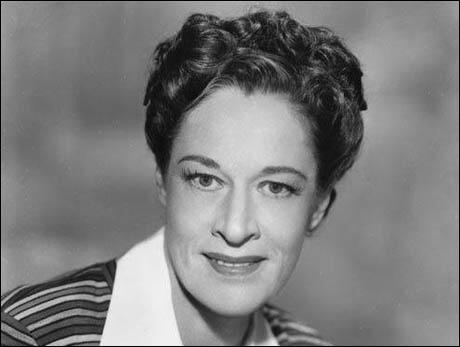
On this day in 2014 Mandy Rice-Davies died of cancer. Marilyn (Mandy) Rice-Davies was born in Mere, Wiltshire, on 21st October, 1944. Her father was a policeman before the war but later the family moved to Solihull where he took up a job at the Dunlop factory. Philip Knightley has pointed out: "Mandy, as she preferred to be called, was the daughter of a failed actress from Wales and a Welsh-born Birmingham policeman. She was a rebel at school, but enjoyed games and art, and sang in the choir in the local Anglican church. Her main interest was horses and she managed to buy and keep a pony of her own by doing a paper delivery round, helping in a racing stable and, later, working on Saturday mornings in a Birmingham dress shop."
Rice-Davies attended Sherman's Cross Secondary Modern School. She got a Saturday job at Marshall & Snelgrove and at the age of 15 she was working as a part-time model. She also started a relationship with a man, five years her senior. She remarked in her autobiography: "I was an enthusiastic participant in what struck me as a perfectly pleasant way to spend an afternoon."
In 1960, aged 16, Rice-Davies was employed as a model at the Earls Court Motor Show. After being paid £80 for the week's work, she decided to move permanently to London. She then got a job as a dancer at Murray's Cabaret Club in Soho where she met Christine Keeler. Rice-Davies claimed "it was dislike at first sight". However, they saw a lot of each other and eventually the two girls took part in "threesome" sex scenes with men. Rice-Davies later recalled: "She was an undemanding friend, happiest with people who made no demands on her. I enjoyed her company and learned never to rely on her for anything."
Christine Keeler introduced Rice-Davies to Stephen Ward and Lord Astor. The two men helped pay the rent for the two women to live in a flat at Comeragh Road. Soon afterwards, Rice-Davies met Keeler's old boyfriend, Peter Rachman. Rice-Davies became his mistress: "I was comfortable with him, he was easy to talk to, a good listener as well as a good talker." Anthony Summers points out in Honeytrap: "On and off, for nearly two years, he was to be her lover and the fount of all good things - and money seemed a very good thing to the sixteen-year-old from Solihull."
During this period Rice-Davies also met Maria Novotny, who ran sex parties in London. So many senior politicians attended that she began referring to herself as the "government's Chief Whip". As well as British politicians such as John Profumo and Ernest Marples, foreign leaders such as Willy Brandt and Ayub Khan, attended these parties.
On 21st January 1961, Colin Coote invited Stephen Ward to have lunch with Eugene Ivanov, an naval attaché at the Soviet embassy. The following month Ward and Christine Keeler moved to 17 Wimpole Mews in Marylebone. According to Keeler's autobiography, The Truth at Last (2001), Roger Hollis and Anthony Blunt were regular visitors to the flat.
On 8th July 1961 Christine Keeler met John Profumo, the Minister of War, at a party at Cliveden. Profumo kept in contact with Keeler and they eventually began an affair. At the same time Keeler was sleeping with Eugene Ivanov, a Soviet spy. According to Keeler: "Their (Ward and Hollis) plan was simple. I was to find out, through pillow talk, from Jack Profumo when nuclear warheads were being moved to Germany."
In December 1961 Mariella Novotny held a party that became known as the "Feast of Peacocks". According to Christine Keeler, there was "a lavish dinner in which this man wearing only... a black mask with slits for eyes and laces up the back... and a tiny apron - one like the waitresses wore in 1950s tearooms - asked to be whipped if people were not happy with his services."
In her autobiography, Mandy (1980) Rice-Davies described what happened when she arrived at Novotny's party in Bayswater: "The door was opened by Stephen (Ward) - naked except for his socks... All the men were naked, the women naked except for wisps of clothing like suspender belts and stockings. I recognised our host and hostess, Mariella Novotny and her husband Horace Dibbins, and unfortunately I recognised too a fair number of other faces as belonging to people so famous you could not fail to recognise them: a Harley Street gynaecologist, several politicians, including a Cabinet minister of the day, now dead, who, Stephen told us with great glee, had served dinner of roast peacock wearing nothing but a mask and a bow tie instead of a fig leaf."
Mandy Rice-Davies claimed: "In early 1962 I received an offer to make a television commercial in the States. The producer had come to England to find a girl with a British accent, typically British-looking." At that time, Michael Lambton, one of Christine Keeler's boyfriends, was working in Philadelphia. Rice-Davies suggested that the two women should go to the United States together. Peter Rachman agreed to pay for trip.
On 11th July, 1962, Rice-Davies and Christine Keeler, arrived in New York City. They stayed at a hotel on Fire Island. According to Rice-Davies she fell asleep on the beach and was badly sunburnt. She telephoned the studio and told them: "I've had this accident - first-degree sunburn. It will take about a month if I am lucky to get my skin back in order." The women returned to London on 18th July. It later emerged that their movements in America were being monitored by the FBI.
On her return to London, Rice-Davies met Earl Felton, a screen-writer. Felton introduced her to Robert Mitchum and for a short time she worked as his personal assistant. According to Christine Keeler, Felton was a CIA agent.
After the death of Peter Rachman Rice-Davies became the mistress of Emil Savundra. Rice-Davies later commented: "Emil was larger than life. Well-born Ceylonese, with a brilliant mind he could have made his fortune in any number of legitimate businesses, but chose instead to give his life that added zest by looking for the dishonest twist in everything he did." Savundra paid her £25 a week for her services.
During this period Christine Keeler became involved with two black men, Lucky Gordon and John Edgecombe. The two men became jealous of each other and this resulted in Edgecombe slashing Gordon's face with a knife. On 14th December 1962, Edgecombe, fired a gun at Stephen Ward's Wimpole Mews flat, where Keeler had been visiting with Rice-Davies.
Keeler and Rice-Davies were interviewed by the police about the incident. According to Rice-Davies, as they left the police station, Keeler was approached by a reporter from the Daily Mirror. "He told her his paper knew 'the lot'. They were interested in buying the letters Profumo had written her. He offered her £2,000."
On 21st March, George Wigg asked the Home Secretary in a debate on the John Vassall affair in the House of Commons, to deny rumours relating to Christine Keeler and the John Edgecombe case. Richard Crossman then commented that Paris Match magazine intended to publish a full account of Keeler's relationship with John Profumo, the Minister of War, in the government. Barbara Castle also asked questions if Keeler's disappearance had anything to do with Profumo.
The following day Profumo made a statement attacking the Labour Party MPs for making allegations about him under the protection of Parliamentary privilege, and after admitting that he knew Keeler he stated: "I have no connection with her disappearance. I have no idea where she is." He added that there was "no impropriety in their relationship" and that he would not hesitate to issue writs if anything to the contrary was written in the newspapers.
On 23rd April 1963, Mandy Rice-Davies was arrested at Heathrow Airport on the way to Spain for a holiday, and formerly charged her with "possessing a document so closely resembling a driving licence as to be calculated to deceive." The magistrate fixed bail at £2,000. She later commented that "not only did I not have that much money, but the policeman in charge made it very clear to me that i would be wasting my energy trying to rustle it up." Rice-Davies spent the next nine days in Holloway Prison.
While she was in custody Rice-Davies was visited by Chief Inspector Samuel Herbert. His first words were: "Mandy, you don't like it in here very much, do you? Then you help us, and we'll help you." Herbert made it clear that Christine Keeler was helping them into their investigation into Stephen Ward. When she provided the information required she would be released from prison.
At first Rice-Davies refused to cooperate but as she later pointed out: "I was ready to kick the system any way I could. But ten days of being locked up alters the perspective. Anger was replaced by fear. I was ready to do anything to get out." Rice-Davies added: "Although I was certain nothing I could say about Stephen could damage him any way... I felt I was being coerced into something, being pointed in a predetermined direction." Herbert asked Rice-Davies for a list of men with whom she had sex or who had given her money during the time she knew Ward. This list included the names of Peter Rachman and Emil Savundra.
Mandy Rice-Davies appeared in court on 1st May 1963. She was found guilty and fined £42. Rice-Davies immediately took a plane to Majorca. A few days later Samuel Herbert telephoned her and said: "They would be sending out my ticket, they wanted me back in London, and if I didn't go voluntarily they would issue a warrant for extradition." Despite the fact that there was no extradition arrangement between the two countries, Rice-Davies decided to return to England.
On her arrival at Heathrow Airport she was arrested and charged with stealing a television set valued at £82. This was the set that Peter Rachman had hired for her flat. According to Rice-Davies: "I had signed the hire papers, and after he'd died I had never been allowed to remove the set." Chief Inspector Herbert arranged for Rice-Davies passport to be taken from her. She was released on the understanding that she would give evidence in court against Stephen Ward.
On 5th June, John Profumo resigned as War Minister. His statement said that he had lied to the House of Commons about his relationship with Christine Keeler. The next day the Daily Mirror said: "What the hell is going on in this country? All power corrupts and the Tories have been in power for nearly twelve years."
Some newspapers called for Harold Macmillan to resign as prime minister. This he refused to do but he did ask Lord Denning to investigate the security aspects of the Profumo affair. Some of the prostitutes who worked for Stephen Ward began to sell their stories to the national press. Mandy Rice-Davies told the Daily Sketch that Christine Keeler had sexual relationships with John Profumo and Eugene Ivanov, an naval attaché at the Soviet embassy.
On 7th June, Keeler told the Daily Express of her secret "dates" with Profumo. She also admitted that she had been seeing Eugene Ivanov at the same time, sometimes on the same day, as Profumo. In a television interview Stephen Ward told Desmond Wilcox that he had warned the security services about Keeler's relationship with Profumo.
The following day Ward was arrested and charged with living off immoral earnings between 1961 and 1963. He was refused bail because it was feared that he might try to influence witnesses. Another concern was that he might provide information on the case to the media.
On 14th June, the London solicitor, Michael Eddowes, claimed that Christine Keeler told him that Eugene Ivanov had asked her to get information about nuclear weapons from Profumo. Eddowes added that he had written to Harold Macmillan to ask why no action had been taken on information he had given to Special Branch about this on 29th March. Soon afterwards Keeler told the News of the World that "I'm no spy, I just couldn't ask Jack for secrets."
The trial of Stephen Ward began at the Old Bailey on July 1963. Christine Keeler and Rice-Davies, were both called as witnesses. Mandy Rice-Davies admitted receiving money and gifts from Peter Rachman and Emil Savundra. As she was living with Ward at the time she gave him some of this money for unpaid rent. As Rice-Davies pointed out: "Much was made of the fact that I was paying him a few pounds a week whilst I was living in Wimpole Mews. But I said before and say it again - Stephen never did anything for nothing and we agreed on the rent the day I arrived. He most certainly never influenced me to sleep with anyone, nor ever asked me to do so." She added: "Stephen was never a blue-and-white diamond, but a pimp? Ridiculous.... As for Christine, she was always borrowing money (from Stephen Ward)."
Ronna Ricardo had said that she had sex for money and then gave it to Ward at a preliminary hearing. However, she retracted this information at the trial and claimed that Chief Inspector Samuel Herbert had forced the statement from her by threats against the Ricardo family. According to Philip Knightley: "Ricardo said that Herbert told her that if she did not agree to help them then the police would take action against her family. Her younger sister, on probation and living with her, would be taken into care. They might even make application to take her baby away from her because she had been an unfit mother."
The main evidence against Stephen Ward came from Vickie Barrett. She claimed that Ward had picked her up in Oxford Street and had taken her home to have sex with his friends. Barrett was unable to name any of these men. She added that Ward was paid by these friends and he kept some of the money for her in a little drawer. Christine Keeler claims that she had never seen Barrett before: "She (Barrett) described Stephen handing out horsewhips, canes, contraceptives and coffee and how, having collected her weapons, she had treated the waiting clients. It sounded, and was, nonsense. I had lived with Stephen and never seen any evidence of anything like that... She has never to my knowledge been seen again. I suspect she was spirited out of the country, given a new identity, a new life."
Ward told his defence counsel, James Burge: "One of my great perils is that at least half a dozen of the (witnesses) are lying and their motives vary from malice to cupidity and fear... In the case of both Christine Keeler and Mandy Rice-Davies there is absolutely no doubt that they are committed to stories which are already sold or could be sold to newspapers and that my conviction would free these newspapers to print stories which they would otherwise be quite unable to print (for libel reasons)."
Stephen Ward was very upset by the judge's summing-up that included the following: "If Stephen Ward was telling the truth in the witness box, there are in this city many witnesses of high estate and low who could have come and testified in support of his evidence." Several people present in the court claimed that Judge Archie Pellow Marshall was clearly biased against Ward. France Soir reported: "However impartial he tried to appear, Judge Marshall was betrayed by his voice."
That night Ward wrote to his friend, Noel Howard-Jones: "It is really more than I can stand - the horror, day after day at the court and in the streets. It is not only fear, it is a wish not to let them get me. I would rather get myself. I do hope I have not let people down too much. I tried to do my stuff but after Marshall's summing-up, I've given up all hope." Ward then took an overdose of sleeping tablets. He was in a coma when the jury reached their verdict of guilty of the charge of living on the immoral earnings of Christine Keeler and Mandy Rice-Davies on Wednesday 31st July. Three days later, Ward died in St Stephen's Hospital.
In his book, The Trial of Stephen Ward (1964), Ludovic Kennedy considers the guilty verdict of Ward to be a miscarriage of justice. In An Affair of State (1987), the journalist, Philip Knightley argues: "Witnesses were pressured by the police into giving false evidence. Those who had anything favourable to say were silenced. And when it looked as though Ward might still survive, the Lord Chief Justice shocked the legal profession with an unprecedented intervention to ensure Ward would be found guilty."
At the end of the Ward trial, Newspapers began reporting on the sex parties attended by Mandy Rice-Davies and Christine Keeler. The Washington Star quoted Rice-Davies as saying "there was a dinner party where a naked man wearing a mask waited on table like a slave." Dorothy Kilgallen wrote an article where she stated: "The authorities searching the apartment of one of the principals in the case came upon a photograph showing a key figure disporting with a bevy of ladies. All were nude except for the gentleman in the picture who was wearing an apron. And this is a man who has been on extremely friendly terms with the very proper Queen and members of her immediate family!"
The News of the World immediately identified the hostess at the dinner party as being Mariella Novotny. Various rumours began to circulate about the name of the man who wore the mask and apron. This included John Profumo and another member of the government, Ernest Marples. Whereas another minister, Lord Hailsham, the leader of the House of Lords at the time, issued a statement saying it was not him. Novotny refused to comment on her activities and the man in the mask remained unidentified. However, Time Magazine speculated that it was film director, Anthony Asquith, the son of former prime minister, Herbert Asquith.
Rice-Davies purchased a mews house in Cornwall Mews West with the money she made from newspaper articles. She tried to make a living as an actress and appeared in two films in 1963, Hide and Seek (not credited) and the Keeler Affair. She also published a book, The Mandy Report, that challenged the conclusions of The Denning Report. However, the publishers disappeared and she claims that she received no money for her book.
In 1964 she was asked to play a lead role in the film Fanny Hill, based on the book written by John Cleland. However, the film was never made. Her next offer was as a singer at Eve's Bar in Munich. She was paid £150 a night. The Times reported: "She came onstage trembling, spoke in a whisper, and apologized that in her nineteen years she had never used a microphone or appeared before a crowd." Rice-Davies followed this with a contract to sing at Cordon Blue for nearly £2,000 a week. She was eventually deported from Turkey for singing Cole Porter's Let's Do It, Let's Fall in Love.
On her return to England she began a tour of Working Men's Clubs. As she pointed out in her autobiography: "One-night stands were particularly well paid. A night here and a night there meant £250 a time." On one occasion she had laryngitis and she was replaced by Tom Jones at the Top Hat in in Cwmtillery. That night Jones was spotted by Gordon Mills, who signed him up and took the young singer to London.
Rice-Davies also toured Spain, Australia, Hong Kong and Singapore but was banned from entering New Zealand as a result of a complaint from the Girl Guides. She was booked for The Sands Hotel in Las Vegas but the authorities refused to grant her a visa. This resulted in her being banned from appearing at El Patio in Mexico City.
While touring Israel Rice-Davies met Rafael Shaul, who owned the Whisky-A-Go-Go in Tel Aviv. The couple were married on 17th September 1966. Soon afterwards they established Mandy's Club. it was a great success: "Mandy's was a membership club: 500 official members and a waiting list which reached several thousands... The club was the first of several. Our brand of expertise became extremely marketable." Rice-Davies also joined forces with Monty Marks, a London-based fashion manufacturer, to open a dress factory aimed at the younger market. She later commented: "By the time I left Israel, it was a very big factory with a huge turnover."
Mandy Rice-Davies parted from her husband in 1971 but they continued to be business partners. She also continued her acting career in Israel and appeared in several films including Kuni Leml B'Tel Aviv (1976), Hershele (1977) and Millioner Betzarot (1978).
In 1980 Mandy Rice-Davies published her autobiography, Mandy. She continued to work as an actress and appeared in Nana (1982), The Seven Magnificent Gladiators (1983), Kuni Leml B'Kahir (1983), Black Venus (1983) and Absolute Beginners (1986).
I was contacted by Mandy Rice-Davies in March, 2009. She objected to a quotation from Christine Keeler that I had included on my website. She also gave me some more information on the case: "Regina v Ward was undoubtedly one of the most vindictively rigged trials of the 20th Century. The Macmillan government, plagued throughout their office by spy cases, were eager to shift the security aspects of the Profumo business out of the spotlight. Aristocratic by nature and clinging to the old values of a swiftly vanishing past, they cast about for lessor, more expendable mortals on who to pin the blame. The establishment aimed their arrows at Stephen Ward and a couple of teenage girls who were doing nothing more than chasing a good time. The police with Machiavellian cunning threw in a couple of known prostitutes to muddy the waters. Three days after Profumo confessed and resigned, Stephen Ward was arrested and a case that barely had legs to stand on was dragged kicking and screaming into court. Ward may have been a man with lax moral standards and uncertain principles, but other than a few muddled insinuations from the priggish prosecution no evidence was produced to show that Stephen Ward was a pimp. There is no doubt that had Ward not committed suicide, the case would have been dismissed on appeal. In regard to myself, the worst I could be accused of is bad judgment and a healthy libido. I was only eighteen years old when the storm broke and after getting on with the rest of my life 1963 still casts a shadow."
One of the most disturbing things that Mandy Rice-Davies told me was that she was convinced that Ward's defence team was in some way involved in the conspiracy. She was told that in court she was asked questions that would enable her to clear Ward of living on her immoral earnings. However, when she testified, she was never asked questions on this matter and therefore was denied the opportunity of saying that the only money she ever gave him was the rent for the flat. In fact, it was Ward who was giving her money.
